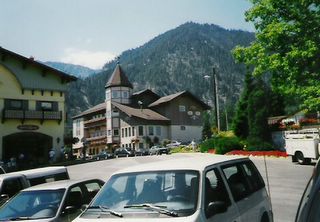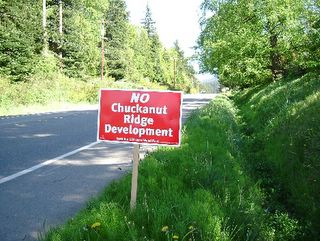
Picture snapped in Leavenworth, WA.
It was mid eighties recession, in Bellingham, WA.
I remember a rousing seminar at Holiday Inn Ballroom. On stage, this dynamic guest of honor from Leavenworth, WA.
He sensed, Bellingham people were hurting, needing money. Businesses, Churches, volunteer organizations, governments, schools, families, all. Thirsting for the ball.
Tourism, he said. You've got I-5 slicing through your town. Let's not frown. We can slow it down. Make em stop, spread their money around.
Proclaim your uniqueness. Recite the motto. Proclaim your uniqueness. Rousing group dynamic. This isn't hollow. Audience follow. Room standing. Chorus thundering. Exit signs rattling. Wait staff wondering.
You've got Mount Baker, the bay, history. Don't keep it a mystery.
Bellingham, just Before Canada. Let's try, "Bellingham BC."
Sing along. Bellingham, Bee See. Bellingham, Bee Seen.
And when they ask, is this "before Christ?" Start that conversation. Best in the nation. Anything for a twist. We're in the minst.
It was a rousing presentation. Standing, stamping, ballroom rumbling. No one mumbling. Give it a boost. You're ruling the roost.
Over in Leavenworth. Speaker said, "Here's how we did it."
It was just another clothing store, but we sported Bruce, the Moose. Hunter's trophy, by the door. So the people came to the store. Pet the nose. Everyone knows, Bruce the Moose. It became a town tradition. Everyone, sing along, Bruce the Moose. Kids got into the act.
Now, let's break up into small groups.
Inventory your assets. Possibilities.
Snow architecture festival? Mt. Baker area? Remember the Slush Cup?
How about this? Even a dorm dining hall, at Western Washington University, has panoramic view of the bay; Viking Commons. Worried look on group facilitator's face, "but, how's the food?"
Yes, the bay view is great, they didn't name Bay View Cemetery for nothing.
Why Bellingham even gets television, in French, from Vancouver, BC., Canada. On UHF, rabbit ears (remember the early eighties). Great place to practice your French. I see no one's sitting on that bench?
What, people leaving the room? Let's try harder for that boom.
How about, "A Saint Patrick's Day Parade" in Downtown Bellingham? It's not a charade.
Now, let's get back together in the big group.
On stage again, wipe the brow. Here's how. Pet the nose. Here goes. Test the microphone. Squeeeeeeeeeeeal, Ouch! Could someone turn down the speaker? 1, 2, 3 Tap, tap. Here at Holiday Inn ballroom.
Seminar dragged on a bit longer, made the local economy stronger.
Results:
Months later, a friend watched Bellingham's Saint Patrick's Day Parade. They talked the "big" radio station into coming to their aid.
Green shirts, green hats, green pants, But didn't allow rants. Poodles with green collars, green leashes.
"Bland," said friend.
Mostly about the green in the wallets. Tradition didn't last that long.
Then there was the big newspaper article about another seed nurtured by that seminar.
This relative of a local artist named Bergsma got inspired. If I remember correctly, here goes...
He ran out the door early. A few may have thought he was squirrely. He had a hunch and didn't even stay for the seminar's lunch. Instead, Leased a space near I-5 Lakeway Drive Exit.
I'll bet they never heard these jingles that crossed my mind, however.
"Bergsma Gallery." "Spend your salary." "Landscapes, beauty, more." "Even on the floor." "Visitor's center next door." "Just off I-5 at Lakeway Drive Exit." "Stop in for the show." "I'll take two Bergsma's and a coke to go?"
So that was revving up our motor some twenty years ago. Was Bellingham, grasping at straws? Waiting for thaws? And now, we're in the minst of a housing boom. Economy is cooking.








